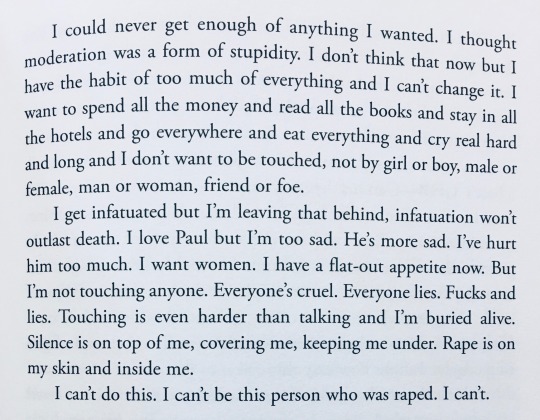Text

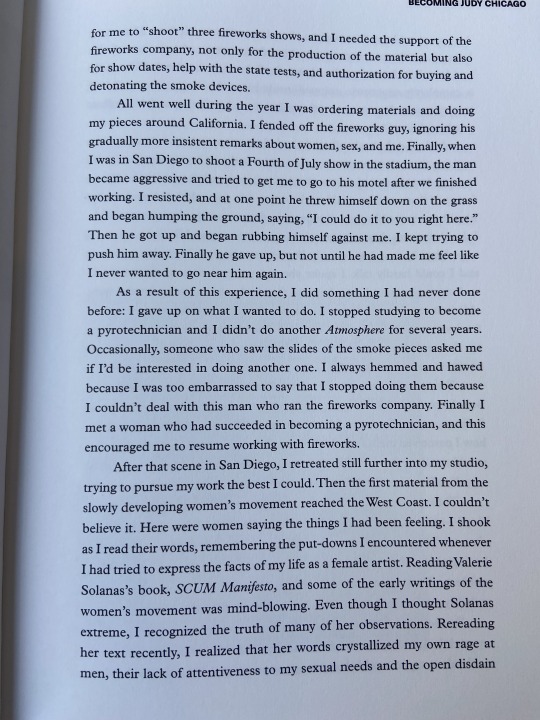
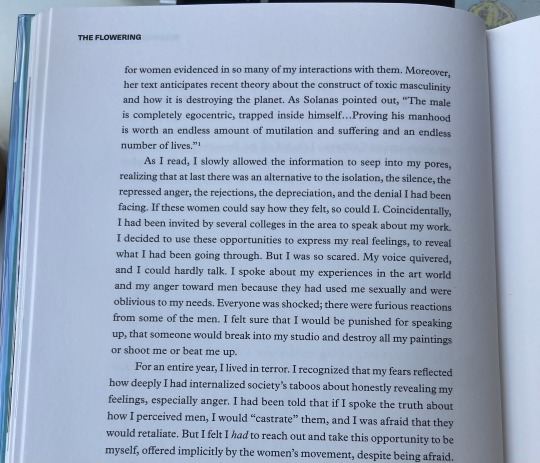
The Flowering by Judy Chicago
40 notes
·
View notes
Text
The Movement was and is correct in stating that women’s collective past bled a river of pain. The Movement tried to call out what is strong in women. We tried to find examples from the past. It’s still hard for many women to grant that strength to a living woman in their midst. Woman-hatred again, dead women are more lovable than living women. Identifying with other women proved rocky at first but over time it became easier. Recognizing that our collective past was as painful as our individual pasts, the Movement sought a solution to all that pain and desolation. Toss away your hateful past and as for a collective past, dip into the mists of matriarchy, at least life was better then. With the help of your sisters you too can build a new and stronger self. When in doubt pray to the Great Mother in the Skies or Isis or Sappho. And here is where we hurt ourselves, intellectually and organizationally. How are we to reach others if we deny our past, personal or collective? We must remember our old, oppressed selves. We must resolve the pain of our mothers. We can’t blot out that past by ignoring the thousands of years of male supremacy and nodding out in the haze of pre-recorded history— matriarchy. We need to unearth that matriarchal past but it is of the utmost importance that we don’t forget for one minute what came between us today and matriarchy. We need to understand our past and use it for the future. One of the earmarks of humanness is a conception of the past and a possibility of the future.
“It’s All Dixie Cups to Me” by Rita Mae Brown in Quest: A Feminist Quarterly, Vol. 1 No. 3 Winter 1975.
40 notes
·
View notes
Text
“The event was a panel on “Lesbianism as a Personal Politic” that took place in New York City, Lesbian Pride Week 1977. A self-proclaimed lesbian separatist had spoken. Amidst the generally accurate description of male crimes against women came this ideological rot, articulated of late with increasing frequency in feminist circles: women and men are distinct species or races (the words are used interchangeably); men are biologically inferior to women; male violence is a biological inevitability; to eliminate it, one must eliminate the species/race itself (means stated on this particular evening: developing parthenogenesis as a viable reproductive reality); in eliminating the biologically inferior species/race Man, the new Ubermensch Womon (prophetically foreshadowed by the lesbian separatist * herself) will have the earthly dominion that is her true biological destiny. We are left to infer that the society of her creation will be good because she is good, biologically good. In the interim, incipient SuperWomon will not do anything to “encourage” women to “collaborate” with men–no abortion clinics or battered woman sanctuaries will come from her. After all, she has to conserve her “energy” which must not be dissipated keeping “weaker” women alive through reform measures. The audience applauded the passages on female superiority/male inferiority enthusiastically. This doctrine seemed to be music to their ears. Was there dissent, silent, buried in the applause? Was some of the response the spontaneous pleasure that we all know when, at last, the tables are turned, even for a minute, even in imagination? Or has powerlessness driven us mad, so that we dream secret dreams of a final solution perfect in its simplicity, absolute in its efficacy? And will a leader someday strike that secret chord, harness those dreams, our own nightmare turned upside down? Is there no haunting, restraining memory of the blood spilled, the bodies burned, the ovens filled, the peoples enslaved, by those who have assented throughout history to the very same demagogic logic? In the audience, I saw women I like or love, women not strangers to me, women who are good not because of biology but because they care about being good, swept along in a sea of affirmation. I spoke out because those women had applauded. I spoke out too because I am a Jew who has studied Nazi Germany, and I know that many Germans who followed Hitler also cared about being good, but found it easier to be good by biological definition than by act. Those people, wretched in what they experienced as their own unbearable powerlessness, became convinced that they were so good biologically that nothing they did could be bad. As Himmler said in 1943: We have exterminated a bacterium [Jews] because we did not want in the end to be infected by the bacterium and die of it. I will not see so much as a small area of sepsis appear here or gain a hold. Wherever it may form, we will cauterize it. All in all, we can say that we have fulfilled this most difficult duty for the love of our people. And our spirit, our soul, our character has not suffered injury from it. So I spoke, afraid. I said that I would not be associated with a movement that advocated the most pernicious ideology on the face of the earth. It was this very ideology of biological determinism that had licensed the slaughter and/or enslavement of virtually any group one could name, including women by men. (“Use their own poison against them,” one woman screamed.) Anywhere one looked, it was this philosophy that justified atrocity. This was one faith that destroyed life with a momentum of its own. Insults continued with unabated intensity as I spoke, but gradually those women I liked or loved, and others I did not know, began to question openly the philosophy they had been applauding and also their own acquiescence. Embraced by many women on my way out, I left still sickened, humiliated by the insults, emotionally devastated by the abuse. Time passes, but the violence done is not undone. It never is.”
— Biological Superiority: The World’s Most Dangerous and Deadly Idea by Andrea Dworkin
(via sullengirlalmlghty)
157 notes
·
View notes
Quote
Thinking About Boy Children, December 1989
I’ve been thinking a lot about the issue of boy children since a really ugly incident erupted at the East Coast Lesbian Festival over the Labor Day weekend, 1989. The festival brochure stated ‘girlcare’ was available, a positive way of saying this is a female-only event. Two Lesbians, co-mothers of an 18 month old boy, circumvented the organizers’ intention by caring for their boy themselves and being discreet about his gender. Their subterfuge was uncovered, revealed to all in a most unpleasant way. The mothers awoke on the last morning of the festival to find their cabin covered with signs: Pricklet Go Home; No Males In Lesbian Space; No Pricks Allowed… Needless to say, the mothers were furious. They asked for support, and they got it.
A contingent of pro-boy Lesbians demanded mike time on the stage before the final concert at noon. The organizers, Lin Daniels and Myriam Fougere, demurred, citing lack of time for public discussion, voicing concern for the performers’ feelings and their valuable equipment, in place on the stage. ‘We are going to read a statement from the stage,’ they announced. ‘You can have it peacefully, with no danger to the equipment; or we can storm the stage. It is your choice.’ Because of the threat, the organizers gave in. The statement, filled with generalizations about love and peace and ‘lets respect our diversity,’ was received with cheers and applause by most of the Lesbians present.
In the meantime, Myriam and Lin drafted Julia Penelope to make a pro Lesbian-only, women-only space statement. She spoke and was booed. She was hissed. She was yelled at. She was called names. ‘If it wasn’t for your father, you wouldn’t be here,’ screamed the Lesbian behind me, followed by roars of approval from others around us. Hundreds of furious Lesbians, their faces distorted by rage, shook their fists in the air. ‘You don’t speak for me,’ they shouted, forgetting in their passion for the rights of boys and their mothers, that Julia belonged to the Lesbian diversity they were respecting moments before.
Most of the festival goers were under forty years old. They haven’t known a time without a visible Lesbian community. Most of them have not experienced their Lesbian life without the presence of Lesbian organizations and groups, newsletters, bookstores, books, records, concerts, festivals; doctors, therapists, psychics, chiropractors; Marches on Washington; Gay Pride Day, DESERT HEARTS and LIANNA in their consciousness, if not their own town. In fact, the Lesbians booing Julia Penelope, for reminding us how little Lesbian-only or women-only space there is on the planet and how much of what we did have is gone, haven’t known a time when there was no turkey-baster or physician-supervised ‘artificial’ insemination for Lesbians at all.
As for Julia Penelope, she is one of those ‘Older Lesbians,’ those 'before Stonewall’ Lifelong Lesbians, the kind of Lesbian that younger Lesbians say they 'need’ as role models, that they 'admire’ for their courage. She is also the Lesbian who brought us one the Lesbian community’s most loved books, the original Coming Out Stories. She is one of the countless Lesbians who created the visible Lesbian community, wresting Lesbian space from the homophobia in the Women’s Liberation Movement and the sexism in the Gay Liberation Movement. She did her share of demonstrating, organizing, confronting, teaching, writing, editing, speaking out for Lesbian rights, helping to make Lesbians visible to ourselves and others. Yet she was booed from the stage by hundreds of Lesbians for trying to remind us how precious Lesbian space is, booed by Lesbians who have never really been without it.
It was a dreadful experience for me, one I have thought about and discussed often since it happened. I was stunned by the fury unleashed upon Julia. Why were so many Lesbians so passionately angry? I talked to some of them at the time. They said they were angry at the Lesbians who sneaked in the night and tacked the signs on the cabin. They hated the signs, too, said they were 'hateful.’ They hated the way mothers were treated. They seemed to see no incongruity between their delight in being at a festival that was bravely billed as a LESBIAN, rather than as a WOMEN’S event and their rage at Julia for supporting the organizers’ boy-free as well as man-free policy.
None of the Lesbians who defended the right of boys to attend a Lesbian event gave a thought to the right of girls to enjoy a few days free from the teasing, bullying, name-calling and ridicule that is common to boys in a group.
I thought about the two mothers who assumed they had the right to bring their boy to a Lesbian, male-free event. They are part of the growing numbers of Lesbians who are taking advantage of changing cultural attitudes, and are becoming mothers outside of licensed, state-supported sexual reproduction. They are the avant-garde in the world-wide movement toward the separation of the erotic from the reproductive in human life. They are the new Lesbian mothers, insisting they will raise a new generation of boys, non-sexist and caring about the rights of women.
Yet the attitude of these mothers was positively reactionary. They could use Lesbian-only, woman-only spaces as opportunities to teach their manchild that women have the right to limit male access to our spaces, our persons. Instead, they chose to allow hundreds of Lesbians to champion his right to erase a brief time of woman-only space for us all. That is male privilege, alive and flourishing in the heart of a Lesbian feminist community, and this particular innocent baby had already experienced it. The experience will be intensified for him, and for all the other boy children like him, every time their mothers, and their many supporters, challenge woman-only space at events they attend, and every time they angrily absent themselves from woman-only events, complaining about 'reverse sexism’ and discrimination.
In trying to understand the why of such behavior, I found myself thinking of our female problems with boundary and access issues of all kinds. When I hear Lesbian mothers say they have been excluded from a woman-only space because their boy children cannot attend, I have to believe they are having trouble establishing boundaries between themselves and their children. They are fusing with the children, responding as if they and the children are one. The irony is that the Lesbians who are supporting them also see them as fused, and are supporting that fusion.
This kind of Lesbian motherhood sounds to me like a minor variation of pre-Women’s Liberation Movement oppressive motherhood, when mother was expected to put a child and HIS interests first before all things that might be necessary, important, pleasurable for her. When children have, or 'know’ they should have, unlimited access to their mother’s time, space, resources, person, boy children learn that mothers/women exist to take care of them, while the girls, even those who grow up to be Lesbians, learn to be the caregivers of men.
I am beginning to think that the Lesbians who created this particular uproar in favor of male access to woman-only space, and the countless other feminists and Lesbians who did the same in the past, are acting out of their unconscious, internalized, female oppression, out of the training they received to be 'women,’ that is to be mothers and wives of men, their caregivers, in the system of dominance and subordination we call the patriarchal family. Because of our training, we are unable to be 'selfish.’ We can’t put our interests and needs, and those of our oppressed sisters and the organizations dedicated to freeing us, ahead of the needs of men. We are still passionately committed to fulfilling the needs of men, whether they are our AIDS afflicted Gaymen brothers, our abusive 'misunderstood’ fathers, or our blameless boy children at a Lesbian event. And we are ready to trash any Lesbian sister who tries to stop us.
P.S. Kay Hagan has written a small, brilliant pamphlet, 'Codependency and the Myth of Recovery; A feminist scrutiny,’ which bridges the space between feminist analysis of the family and twelve step programs approach to family.
Are You Girls Traveling Alone? Marilyn Murphy, 1991. (via lesbianfeminists)
The most important takeaway for anyone scrolling past a long quote post: They could use Lesbian-only, woman-only spaces as opportunities to teach their manchild that women have the right to limit male access to our spaces, our persons. Instead, they chose to allow hundreds of Lesbians to champion his right to erase a brief time of woman-only space for us all. That is male privilege, alive and flourishing in the heart of a Lesbian feminist community, and this particular innocent baby had already experienced it.
(via our-common-condition)
454 notes
·
View notes
Quote
"What’s the point of praying for rain, if you haven’t got any buckets?"—Overheard at a women’s music festival
The speaker was not really talking about rain. She was talking about social change. And she pointed out that people don’t make revolutions; revolutions happen. This is not to say they come out of the blue. But they occur when the readiness for change creates the conditions to precipitate that change.
What are our buckets as radical feminists? What are the forms that might contain our bounty?
Well, for instance, what are these institutions we would be setting up if we had enlightened government-spending policies? What is the curriculum we would teach in a perfect world? What would our child-raising practices be if the welfare of the child were considered a priority in all areas of our life? What would our sexual practices be if we found ourselves suddenly showered with the qualities we lost through childhood terrorism and patriarchal brainwashing? How would we structure our day in a world where we could be sustained by what had meaning for us? How would we treat one another in a world where every woman was allowed to own her power?
You would be surprised how energizing, how radicalizing, and how satisfying it can be to get those buckets ready in the middle of a drought. And buckets—even empty ones—change the landscape. They do. They set everyone to thinking. And maybe, just maybe, sitting around with all those sturdy buckets to inspire us, we’ll realize that it might not take a miracle from the sky after all, but just some powerful, get-down brainstorming and coalition to figure out some other way to get those buckets filled.
Carolyn Gage, Like There’s No Tomorrow
89 notes
·
View notes
Text
“The girls of the sixties had mothers who predicted, insisted, argued that those girls would be hurt; but they would not say how or why. In the main, the mothers appeared to be sexual conservatives: they upheld the marriage system as a social ideal and were silent about the sex in it. Sex was a duty inside marriage; a wife’s attitude toward it was irrelevant unless she made trouble, went crazy, fucked around. Mothers had to teach their daughters to like men as a class—be responsive to men as men, warm to men as men—and at the same time to not have sex. Since males mostly wanted the girls for sex, it was hard for the girls to understand how to like boys and men without also liking the sex boys and men wanted. The girls were told nice things about human sexuality and also told that it would cost them their lives—one way or another. The mothers walked a tough line: give the girls a good attitude, but discourage them. The cruelty of the ambivalence communicated itself, but the kindness in the intention did not: mothers tried to protect their daughters from many men by directing them toward one; mothers tried to protect their daughters by getting them to do what was necessary inside the male system without ever explaining why. They had no vocabulary for the why—why sex inside marriage was good but outside marriage was bad, why more than one man turned a girl from a loving woman into a whore, why leprosy or paralysis were states preferable to pregnancy outside marriage. They had epithets to hurl, but no other discourse. Silence about sex in marriage was also the only way to avoid revelations bound to terrify—revelations about the quality of the mothers’ own lives.”
Andrea Dworkin, Right Wing Women
955 notes
·
View notes
Photo
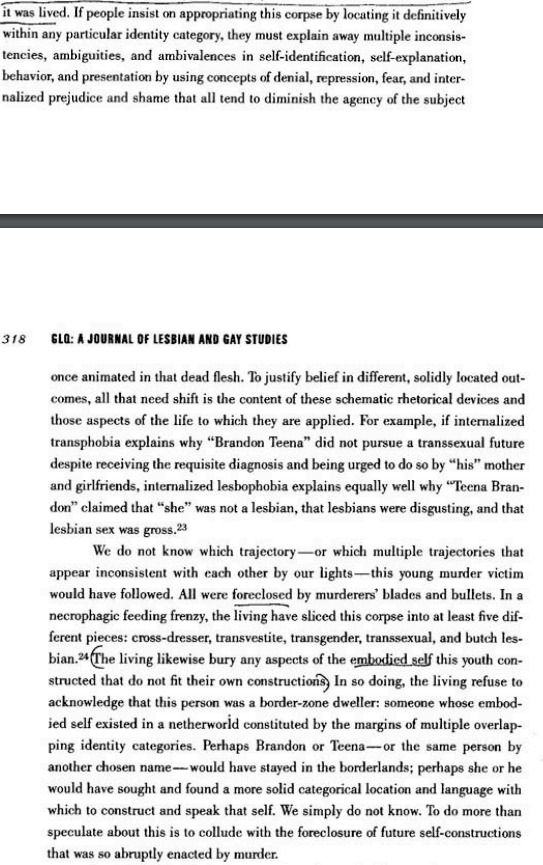
Consuming the Living, Dis(re)membering the Dead in the Butch/FTM Borderlands - C. Jacob Hale
36 notes
·
View notes
Quote
Unlike feminist conferences today, […] there were no speakers at feminist conferences in those days; we thought that was elitist - we never ever had speakers. What happened was that any woman could write a paper for the conference. So they would write a paper, usually about two sides of A4, […] and we would take these to the conference the next day and put them in the entrance, and women would pick up all the papers - which could be written by anybody - and then there would often be workshops about the papers. [The papers] were all very short so [the women] could read them quickly and think, “I’ll go to that workshop.” I say all of this simply because feminists today do not know how this took place; they have these conferences where there are speakers up at the front - it’s a totally different thing. So these women would read the short papers and in the workshops [engage in] equal discussion amongst ourselves. Also what happened was that the discussions got further; […] conference papers at one conference would answer conference papers of the previous conference, and then they’d go in a newsletter, and so on. So theory was built in a way that doesn’t really happen today.
Sheila Jeffreys x
630 notes
·
View notes
Quote
As trashing has become more prevalent, I have become more puzzled by the question of why. What is it about the Women's Movement that supports and even encourages self-destruction? How can we on the one hand talk about encouraging women to develop their own individual potential and on the other smash those among us who do just that? Why do we damn our sexist society for the damage it does to women, and then damn those women who do not appear as severely damaged by it? Why has consciousness-raising not raised our consciousness about trashing?
The obvious answer is to root it in our oppression as women, and the group self-hate which results from our being raised to believe that women are not worth very much. Yet such an answer is far too facile; it obscures the fact that trashing does not occur randomly. Not all women or women's organizations trash, at least not to the same extent. It is much more prevalent among those who call themselves radical than among those who don't; among those who stress personal changes than among those who stress institutional ones; among those who can see no victories short of revolution than among those who can be satisfied with smaller successes; and among those in groups with vague goals than those in groups with concrete ones.
I doubt that there is any single explanation to trashing; it is more likely due to varying combinations of circumstances which are not always apparent even to those experiencing them. But from the stories I've heard, and the groups I've watched, what has impressed me most is how traditional it is. There is nothing new about discouraging women from stepping out of place by the use of psychological manipulation. This is one of the things that have kept women down for years; it is one thing that feminism was supposed to liberate us from. Yet, instead of an alternative culture with alternative values, we have created alternative means of enforcing the traditional culture and values. Only the name has changed; the results are the same.
While the tactics are traditional, the virulence is not. I have never seen women get as angry at other women as they do in the Movement. In part this is because our expectations of other feminists and the Movement in general are very high, and thus difficult to meet. We have not yet learned to be realistic in our demands on our sisters or ourselves. It is also because other feminists are available as targets for rage.
Rage is a logical result of oppression. It demands an outlet. Because most women are surrounded by men whom they have learned it is not wise to attack, their rage is often turned inward. The Movement is teaching women to stop this process, but in many instances it has not provided alternative targets. While the men are distant, and the "system" too big and vague, one's "sisters" are close at hand. Attacking other feminists is easier and the results can be more quickly seen than by attacking amorphous social institutions. People are hurt; they leave. One can feel the sense of power that comes from having "done something." Trying to change an entire society is a very slow, frustrating process in which gains are incremental, rewards diffuse, and setbacks frequent. It is not a coincidence that trashing occurs most often and most viciously by those feminists who see the least value in small, impersonal changes and thus often find themselves unable to act against specific institutions.
The Movement's emphasis on "the personal is political" has made it easier for trashing to flourish. We began by deriving some of our political ideas from our analysis of our personal lives. This legitimated for many the idea that the Movement could tell us what kind of people we ought to be, and by extension what kind of personalities we ought to have. As no boundaries were drawn to define the limits of such demands, it was difficult to preclude abuses. Many groups have sought to remold the lives and minds of their members, and some have trashed those who resisted. Trashing is also a way of acting out the competitiveness that pervades our society, but in a manner that reflects the feelings of incompetence that trashers exhibit. Instead of trying to prove one is better than anyone else, one proves someone else is worse. This can provide the same sense of superiority that traditional competition does, but without the risks involved.
TRASHING: The Dark Side of Sisterhood
by Jo Freeman, Joreen
46 notes
·
View notes
Quote
POLITICAL IMPOTENCE
Unstructured groups may be very effective in getting women to talk about their lives; they aren't very good for getting things done. It is when people get tired of "just talking" and want to do something more that the groups flounder, unless they change the nature of their operation. Occasionally, the developed informal structure of the group coincides with an available need that the group can fill in such a way as to give the appearance that an Unstructured group "works." That is, the group has fortuitously developed precisely the kind of structure best suited for engaging in a particular project.
While working in this kind of group is a very heady experience, it is also rare and very hard to replicate. There are almost inevitably four conditions found in such a group;
1) It is task oriented. Its function is very narrow and very specific, like putting on a conference or putting out a newspaper. It is the task that basically structures the group. The task determines what needs to be done and when it needs to be done. It provides a guide by which people can judge their actions and make plans for future activity.
2) It is relatively small and homogeneous. Homogeneity is necessary to insure that participants have a "common language" for interaction. People from widely different backgrounds may provide richness to a consciousness-raising group where each can learn from the others' experience, but too great a diversity among members of a task-oriented group means only that they continually misunderstand each other. Such diverse people interpret words and actions differently. They have different expectations about each other's behavior and judge the results according to different criteria. If everyone knows everyone else well enough to understand the nuances, these can be accommodated. Usually, they only lead to confusion and endless hours spent straightening out conflicts no one ever thought would arise.
3) There is a high degree of communication. Information must be passed on to everyone, opinions checked, work divided up, and participation assured in the relevant decisions. This is only possible if the group is small and people practically live together for the most crucial phases of the task. Needless to say, the number of interactions necessary to involve everybody increases geometrically with the number of participants. This inevitably limits group participants to about five, or excludes some from some of the decisions. Successful groups can be as large as 10 or 15, but only when they are in fact composed of several smaller subgroups which perform specific parts of the task, and whose members overlap with each other so that knowledge of what the different subgroups are doing can be passed around easily.
4) There is a low degree of skill specialization. Not everyone has to be able to do everything, but everything must be able to be done by more than one person. Thus no one is indispensable. To a certain extent, people become interchangeable parts.
PRINCIPLES OF DEMOCRATIC STRUCTURING
Once the movement no longer clings tenaciously to the ideology of "structurelessness," it is free to develop those forms of organization best suited to its healthy functioning. This does not mean that we should go to the other extreme and blindly imitate the traditional forms of organization. But neither should we blindly reject them all. Some of the traditional techniques will prove useful, albeit not perfect; some will give us insights into what we should and should not do to obtain certain ends with minimal costs to the individuals in the movement. Mostly, we will have to experiment with different kinds of structuring and develop a variety of techniques to use for different situations. The Lot System is one such idea which has emerged from the movement. It is not applicable to all situations, but is useful in some. Other ideas for structuring are needed. But before we can proceed to experiment intelligently, we must accept the idea that there is nothing inherently bad about structure itself -- only its excess use.
While engaging in this trial-and-error process, there are some principles we can keep in mind that are essential to democratic structuring and are also politically effective:
1) Delegation of specific authority to specific individuals for specific tasks by democratic procedures. Letting people assume jobs or tasks only by default means they are not dependably done. If people are selected to do a task, preferably after expressing an interest or willingness to do it, they have made a commitment which cannot so easily be ignored.
2) Requiring all those to whom authority has been delegated to be responsible to those who selected them. This is how the group has control over people in positions of authority. Individuals may exercise power, but it is the group that has ultimate say over how the power is exercised.
3) Distribution of authority among as many people as is reasonably possible. This prevents monopoly of power and requires those in positions of authority to consult with many others in the process of exercising it. It also gives many people the opportunity to have responsibility for specific tasks and thereby to learn different skills.
4) Rotation of tasks among individuals. Responsibilities which are held too long by one person, formally or informally, come to be seen as that person's "property" and are not easily relinquished or controlled by the group. Conversely, if tasks are rotated too frequently the individual does not have time to learn her job well and acquire the sense of satisfaction of doing a good job.
5) Allocation of tasks along rational criteria. Selecting someone for a position because they are liked by the group or giving them hard work because they are disliked serves neither the group nor the person in the long run. Ability, interest, and responsibility have got to be the major concerns in such selection. People should be given an opportunity to learn skills they do not have, but this is best done through some sort of "apprenticeship" program rather than the "sink or swim" method. Having a responsibility one can't handle well is demoralizing. Conversely, being blacklisted from doing what one can do well does not encourage one to develop one's skills. Women have been punished for being competent throughout most of human history; the movement does not need to repeat this process.
6) Diffusion of information to everyone as frequently as possible. Information is power. Access to information enhances one's power. When an informal network spreads new ideas and information among themselves outside the group, they are already engaged in the process of forming an opinion -- without the group participating. The more one knows about how things work and what is happening, the more politically effective one can be.
7) Equal access to resources needed by the group. This is not always perfectly possible, but should be striven for. A member who maintains a monopoly over a needed resource (like a printing press owned by a husband, or a darkroom) can unduly influence the use of that resource. Skills and information are also resources. Members' skills can be equitably available only when members are willing to teach what they know to others.
When these principles are applied, they insure that whatever structures are developed by different movement groups will be controlled by and responsible to the group. The group of people in positions of authority will be diffuse, flexible, open, and temporary. They will not be in such an easy position to institutionalize their power because ultimate decisions will be made by the group at large. The group will have the power to determine who shall exercise authority within it.
THE TYRANNY of STRUCTURELESSNESS
by Jo Freeman aka Joreen
23 notes
·
View notes
Quote
Contrary to what we would like to believe, there is no such thing as a structureless group. Any group of people of whatever nature that comes together for any length of time for any purpose will inevitably structure itself in some fashion. The structure may be flexible; it may vary over time; it may evenly or unevenly distribute tasks, power and resources over the members of the group. But it will be formed regardless of the abilities, personalities, or intentions of the people involved. The very fact that we are individuals, with different talents, predispositions, and backgrounds makes this inevitable. Only if we refused to relate or interact on any basis whatsoever could we approximate structurelessness -- and that is not the nature of a human group.
...
Because elites are informal does not mean they are invisible. At any small group meeting anyone with a sharp eye and an acute ear can tell who is influencing whom. The members of a friendship group will relate more to each other than to other people. They listen more attentively, and interrupt less; they repeat each other's points and give in amiably; they tend to ignore or grapple with the "outs" whose approval is not necessary for making a decision. But it is necessary for the "outs" to stay on good terms with the "ins." Of course the lines are not as sharp as I have drawn them. They are nuances of interaction, not prewritten scripts. But they are discernible, and they do have their effect. Once one knows with whom it is important to check before a decision is made, and whose approval is the stamp of acceptance, one knows who is running things.
...
The criteria of participation may differ from group to group, but the means of becoming a member of the informal elite if one meets those criteria art pretty much the same. The only main difference depends on whether one is in a group from the beginning, or joins it after it has begun. If involved from the beginning it is important to have as many of one's personal friends as possible also join. If no one knows anyone else very well, then one must deliberately form friendships with a select number and establish the informal interaction patterns crucial to the creation of an informal structure. Once the informal patterns are formed they act to maintain themselves, and one of the most successful tactics of maintenance is to continuously recruit new people who "fit in." One joins such an elite much the same way one pledges a sorority. If perceived as a potential addition, one is "rushed" by the members of the informal structure and eventually either dropped or initiated. If the sorority is not politically aware enough to actively engage in this process itself it can be started by the outsider pretty much the same way one joins any private club. Find a sponsor, i.e., pick some member of the elite who appears to be well respected within it, and actively cultivate that person's friendship. Eventually, she will most likely bring you into the inner circle.
...
The idea of "structurelessness" has created the "star" system. We live in a society which expects political groups to make decisions and to select people to articulate those decisions to the public at large. The press and the public do not know how to listen seriously to individual women as women; they want to know how the group feels. Only three techniques have ever been developed for establishing mass group opinion: the vote or referendum, the public opinion survey questionnaire, and the selection of group spokespeople at an appropriate meeting. The women's liberation movement has used none of these to communicate with the public. Neither the movement as a whole nor most of the multitudinous groups within it have established a means of explaining their position on various issues. But the public is conditioned to look for spokespeople.
...
This has several negative consequences for both the movement and the women labeled "stars." First, because the movement didn't put them in the role of spokesperson, the movement cannot remove them. The press put them there and only the press can choose not to listen. The press will continue to look to "stars" as spokeswomen as long as it has no official alternatives to go to for authoritative statements from the movement. The movement has no control in the selection of its representatives to the public as long as it believes that it should have no representatives at all. Second, women put in this position often find themselves viciously attacked by their sisters. This achieves nothing for the movement and is painfully destructive to the individuals involved.
...
As long as the women's liberation movement stays dedicated to a form of organization which stresses small, inactive discussion groups among friends, the worst problems of Unstructuredness will not be felt. But this style of organization has its limits; it is politically inefficacious, exclusive, and discriminatory against those women who are not or cannot be tied into the friendship networks. Those who do not fit into what already exists because of class, race, occupation, education, parental or marital status, personality, etc., will inevitably be discouraged from trying to participate. Those who do fit in will develop vested interests in maintaining things as they are.
The informal groups' vested interests will be sustained by the informal structures which exist, and the movement will have no way of determining who shall exercise power within it. If the movement continues deliberately to not select who shall exercise power, it does not thereby abolish power. All it does is abdicate the right to demand that those who do exercise power and influence be responsible for it. If the movement continues to keep power as diffuse as possible because it knows it cannot demand responsibility from those who have it, it does prevent any group or person from totally dominating. But it simultaneously insures that the movement is as ineffective as possible. Some middle ground between domination and ineffectiveness can and must be found.
THE TYRANNY of STRUCTURELESSNESS
by Jo Freeman aka Joreen
3 notes
·
View notes
Text
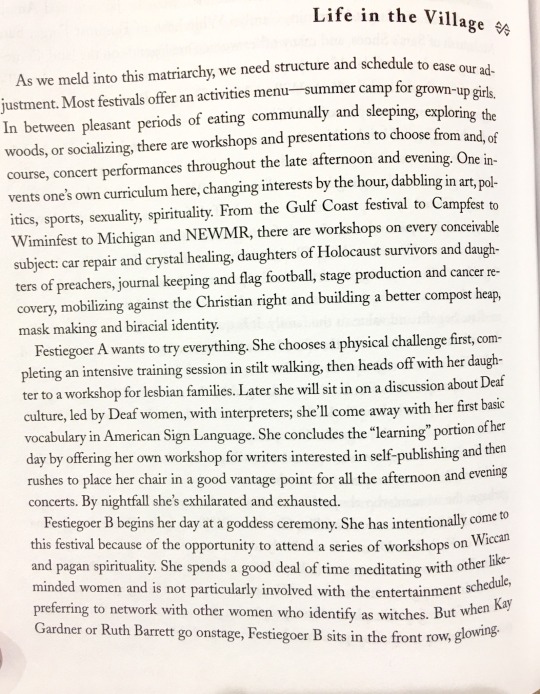
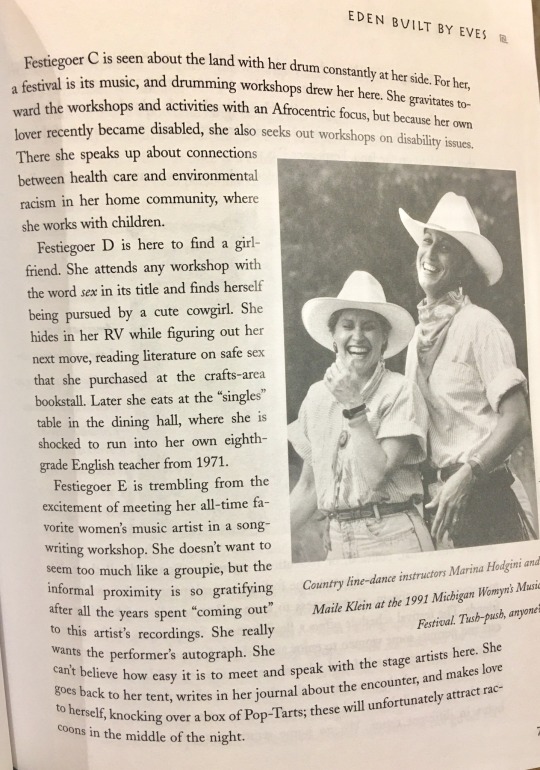
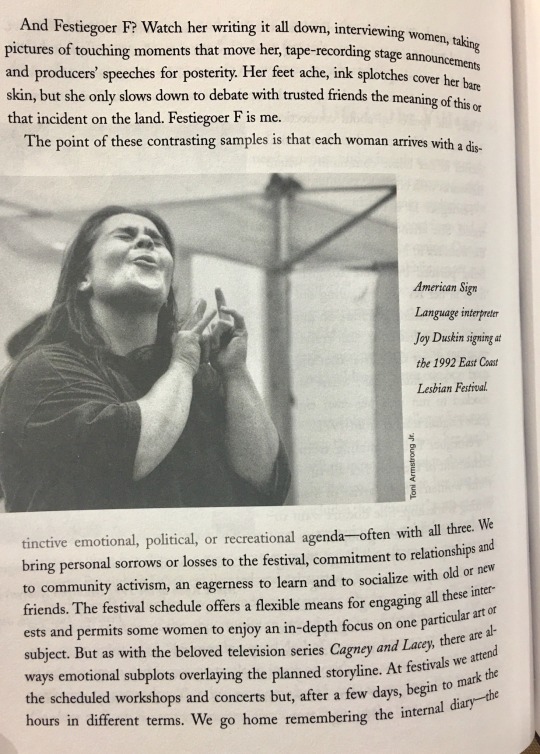
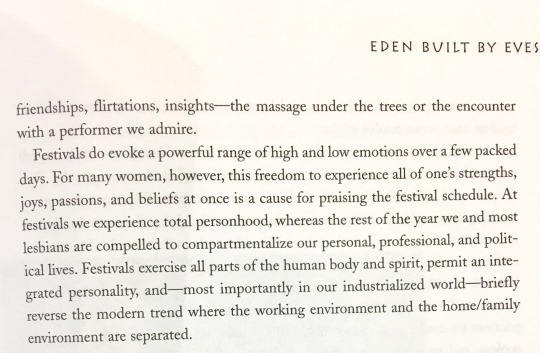
Bonnie Morris, “Eden Built by Eves”
225 notes
·
View notes
Text
“They [leftist men] could sometimes admit that women were oppressed (but only by “the system”) and said that we should have equal pay for equal work, and some other “rights.” But they belittled us no end for trying to bring our so-called “personal problems” into the public arena—especially “all those body issues” like sex, appearance, and abortion. Our demands that men share the housework and childcare were likewise deemed a personal problem between a woman and her individual man. The opposition claimed if women would just “stand up for themselves” and take more responsibility for their own lives, they wouldn’t need to have an independent movement for women’s liberation. What personal initiative wouldn’t solve, they said, “the revolution” would take care of if we would just shut up and do our part.”
— Carol Hanisch, introduction to “The Personal Is Political”
(via reading-blog)
4K notes
·
View notes
Text
full text
The shame of men in front of women is, I think, an appropriate response both to what men do do and to what men do not do. I think you should be ashamed. But what you do with that shame is to use it as an excuse to keep doing what you want and to keep not doing anything else; and you’ve got to stop. You’ve got to stop. Your psychology doesn’t matter. How much you hurt doesn’t matter in the end any more than how much we hurt matters. If we sat around and only talked about how much rape hurt us, do you think there would have been one of the changes that you have seen in this country in the last fifteen years? There wouldn’t have been. It is true that we had to talk to each other. How else, after all, were we supposed to find out that each of us was not the only woman in the world not asking for it to whom rape or battery had ever happened? We couldn’t read it in the newspapers, not then. We couldn’t find a book about it. But you do know and now the question is what you are going to do; and so your shame and your guilt are very much beside the point. They don’t matter to us at all, in any way. They’re not good enough. They don’t do anything.
–Andrea Dworkin, “I Want a Twenty-Four-Hour Truce During Which There Is No Rape” (1984), collected in Last Days at Hot Slit: The Radical Feminism of Andrea Dworkin (2019)
7 notes
·
View notes
Text
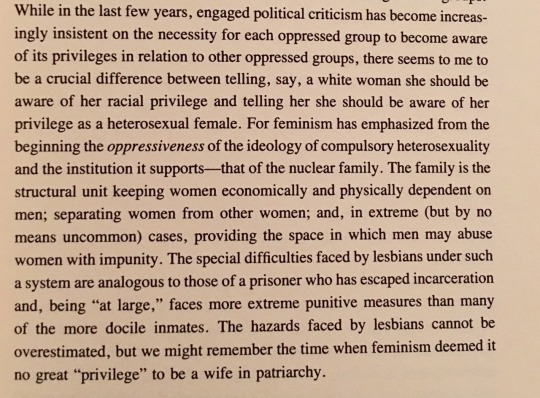
“Feminism Without Women” - Tania Modleski
198 notes
·
View notes
Link
Despite support from writers including Virginia Woolf and EM Forster, it was banned in the UK until 1949, after Hall’s death. But newly revealed papers from the author’s archive, which are set to be digitised by the Harry Ransom Center at the University of Texas alongside those of her partner, the artist Una Vincenzo, Lady Troubridge, show that the novel was also supported by thousands of readers, who wrote to Hall in outrage at the ban.
“The picture you paint of the poor invert should make everyone more charitable … No one could finish your book, Miss Hall, without donning a sword and shield forever in the cause of inverts,” wrote one reader from the US, where the novel was not withdrawn despite a challenge, a court declaring it not obscene.
“It has made me want to live and to go on … I discovered myself in Paris and I dreaded this thing which I thought abnormal,” wrote another.
Dr Steven Macnamara, who has researched Hall’s papers, said she received “thousands of letters of support”.
“The letters demonstrate the public’s awareness that The Well of Loneliness was not an obscene novel, and that Hall had been unfairly and unjustly treated by the government and the media. Access to these letters, through the future digitalisation project, will enhance the importance and understanding of this groundbreaking novel for Hall’s contemporary readers,” he said.
In one letter, a married coal miner in Doncaster wrote that he had “marvelled at the bigoted outlook of so-called ‘thinking men’, who are ashamed to let broader minded folk than themselves delve into the great sex problems”. The miner added: “Some day we will wake up, and demand to know ourselves as we profess to know about everything else.”
50 notes
·
View notes

